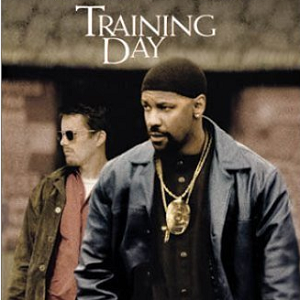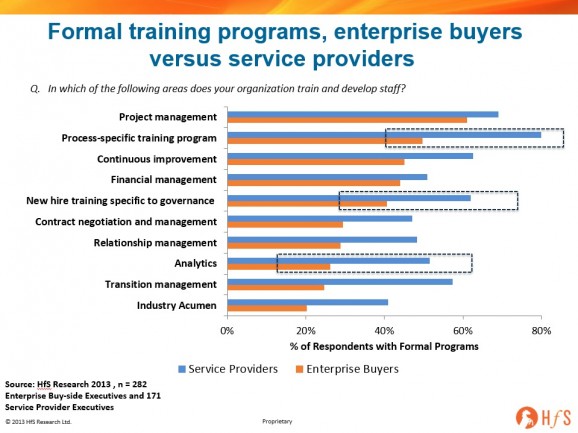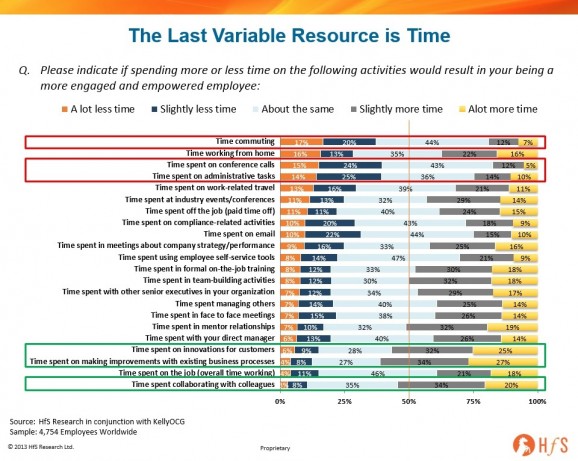And now for the third and final installment in Christa Degnan Manning’s discussion on HR’s obsession with obsolete processes…

People leadership problems like “Smarter management talent,” and “Better talent in the HR function,” are in the top 3 challenges to employee engagement uncovered in our survey while “Better technology implementations/user experience” ranked #11 and “Improved data capability/analytics to support my job” ranked #12. Unfortunately there has been too much focus on HR process and automation in companies, with the latest hype around integration and analytics as the next breakthrough “gotta have” investments.
However, people lead people and they are asking for the support, training, and enablement to meet and collaborate to both better manage day-to-day work and develop into the next generation of leaders. In another recent study HfS conducted on global business services functions, we explicitly asked about investments in formal business training in many key areas today by type of worker: enterprise or service provider.
What we found confirmed results found throughout the engagement research that workers are not getting development support: the majority are not getting any kind of formal training in critical business areas at all. As the extended enterprise expands, ambitious professionals may very well choose to work at service provider companies specifically because the traditional enterprise has dropped the ball in terms of its people. Will this be the tail wagging the dog?
When we asked workers in the engagement survey how they want to spend their time, regardless of engagement level, they did not call for more automation or integration. They said they want to improve existing business processes, innovate for customers, and collaborate with colleagues.
While a whole blog could be written on the trade offs of working from home and commuting (and likely will be at some point!), it is clear workers do not want to spend time on conference calls, administrative tasks, email, and compliance related activities. So companies should be relentless about giving them their time back.
There are actually great technologies out there to help manage hourly workers time – why not treat every worker as having a finite number of hours and assign them to company goals by skill set, availability, and interest? And we are not just talking hourly billable consultants here.
Measure managers on making sure that workers don’t just do what makes the manager look good, but focus them on the right priorities and give them the assignments that help with their career progression whether that will be inside or outside the company (btw stay tuned for the full write up on the HR Technology conference where some innovative companies are headed in this direction.) One has to wonder if the cut-backs in training have come out of the need for cost savings, the lack of actual career progression opportunities inside firms, or a perverse fear that new skills sets will make workers more marketable elsewhere. Guess what? They are all foolish gambles.
Also, simply give people money to get together. While some individuals reported they wanted to travel less to be more engaged, a greater number said they wanted to spend more time traveling (32%) and to attend industry conferences and events (49%), which are huge professional development and relationship building opportunities. And fully half the survey respondents said they want to spend more time in team building activities, in mentor relationships, and in actual formal on the job training. Simply put, workers are starved for meaningful interaction.
Having been involved in econometric research analysis in the travel industry, I can tell you that the dramatic cutbacks of travel and entertainment budgets in 2009 and 2010 actually exacerbated the recession as people stopped going out and connecting with customers and converting prospects, as well as having internal meetings and holding in-person training. Harvard and MIT have also done a compelling study that shows that the longer teams go without in-person meetings, the more trust is eroded and productivity suffers (For copies of either of these studies, just ask.)
So ironically despite the wide-spread adoption of the term “human capital,” companies lost sight of the fact that economists use the term human capital not just as what people are inherently worth, but also how investments in people like education and training increase their value. The modern organization has stopped making too many of these investments it seems in favor of automation at a time when companies need to rethink the very people processes they seek to automate.
The Bottom-line: It’s all about people being empowered by technology across the extended enterprise
The engagement survey results do show significant correlations between satisfactions with many software solutions (which we look forward to highlighting in the full report), but in the short term, these study highlights and suggestions should serve as reminders that business operating improvements and results are not the outcomes of automation or even outsourcing alone, but of aligning a team around a shared purpose, building relationships, removing barriers, and automating and/or removing administrative and non-value added activities.
The best research take away from this study, as well as the HR Technology conference last week where I met with old and new contacts alike, was that people make the difference in every business and they do their best work when they are motivated by people they can believe in, whom they have a personal connection with based on trust, and who reward their loyalty and best efforts. And they are not distracted by process automation and compliance for their own sakes.
Too many workers today are uninspired, unfaithful, and ironically frustrated they are not being tapped to create new value in business. A pervasive atmosphere of fear exists to cling to the jobs left after the “jobless recovery,” where they go through the motions of their roles just enough to stay away from the ends of the performance curve, and may have even stopped complaining (openly) that they are not given the time and monetary resources to drive innovation and customer success.
But now they have spoken. And we all have to smarten up.
Click here to listen to the Engaging the Extended Enterprise industry panel webcast that reviewed early findings from the Power to the People engagement survey. Watch for the full report to be published in November 2013.
Posted in : Business Process Outsourcing (BPO), HfSResearch.com Homepage, HR Outsourcing, HR Strategy, Sourcing Best Practises, Talent in Sourcing, the-industry-speaks










[…] tuned for Part 3 (click here to read), where Christa discusses measures enterprises can take to improve the engagement levels of […]
Christa, one sentence jumped out for me “”business operating improvements and results are not the outcomes of automation or even outsourcing alone, but of aligning a team around a shared purpose””. We ignore the human factor at our peril. And while I fundamentally believe in both human capital and the support software and tools, lazy “fire and forget” software implementations that treat people as cogs in a machine, entirely miss the point: human capital is, first and foremost, human.